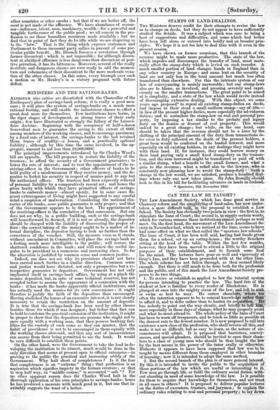STAMPS ON LAND-DEALINGS.
THE Ministers deserve credit for their attempts to revise the law as to stamps on deeds, but they do not appear to have sufficiently studied the details. It was a subject which was sure to bring a host of suggestions and difficulties, and some which- had better have been left alone or entered into boldly and on broader prin-. ciples. We hope it is not too late to deal thus with it even in the present session. We have shown on former occasions, that this branch of the revenue might be made more productive. The 'state of the law, which impedes and discourages the transfer of land, must mate- rially affect the stamp-duty which is levied on such transfer. A much smaller portion of land changes hands in England than in any other country in Europe ; and sums lent on the security of land are not only less in the total amount but much less often transferred than elsewhere. For this the intricate system of our law of conveyancing is mainly answerable ; but our stamp-laws also are to blame, as involved, and pressing severely and capri- ciously on the smaller transactions. The great point to be aimed at is simplicity, and a state of the law which would invite instead of discouraging extensive dealing. With this object, we some _ years ago proposed* to repeal all existing stamp-duties on deeds, and impose in their stead a small uniform stamp—say-of .108.— in lieu of-the present higher duties more especially the ad-valorem duties; and to assimilate the stamp-law on real and personal pro- perty, by imposing a tax similar to the probate and legacy duty on the' demise or descent of real property. This would indeed be a great change ; but while, on the one hand, care should be taken that the revenue should net be a loser by the shifting of the principal amount of the duty from transactions in- ter vivos to duty collected on the death of the .present holders, a great boon would be conferred on the landed interest, and more especially on all existing holders, in any dealings they might have with their land. If, for instance, they could borrow money on their land paying only a small fixed stamp-duty on the transac- tion and the sum borrowed might be transferred or paid off with a similar stamp, what a benefit to the. small farmer, and- what a gain to Ake. revenue ; what a relief' also to the, lawyerixwliolis constantly -now planning how to avoid the stamp-duty ! IdStitfrla change in the law would, we are satisfied, produces huntliesyd,ejt1- ings where only one now takes place. . Sir John RomillY:shOuld look to this in his bill for facilitating advances on lands in Ireland:.
-* Spectator, 225 November 1845.
























 Previous page
Previous page